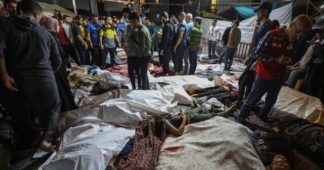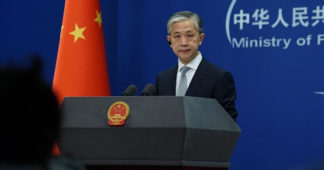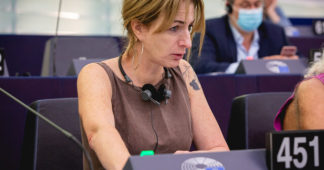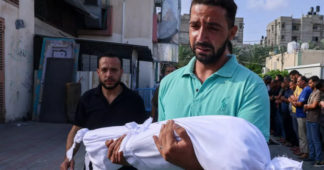By Lubna Masarwa
Apr. 7, 2025
I’m sat a coffee shop in Jaffa.
One of the oldest cities in the world, Jaffa was once a flourishing Palestinian metropolis on the shores of the Mediterranean Sea with its own cultural life, newspapers, publishing houses, cinemas and theatres.
Today, however, it’s been reduced to a suburb of Tel Aviv.
Israeli Jews live in gated communities and Palestinians are pushed out by prices only affluent Ashkenazis can afford.
Anywhere else it would be called gentrification, but in Israel this population transfer has an ethnic flavour.
The coffee shop I’m at is teeming with customers. It’s just another day here in the busy life of secular Israel.
There’s a woman sitting near me with her coffee whilst holding a yoga mat. A couple converse about a play they saw the day earlier at a theatre. They’re also planning their Passover dinner that’s coming soon.
This could be a scene out of any Western capital. Here though, there’s just one tiny difference, it’s business as usual one hour’s drive away from Gaza.
At this point I look at my iPhone.
Every morning for over 18 months Ahmed has been messaging me from Khan Younis.
“Tonight, 19 people were killed in the bombing of tents and homes in Khan Younis. I have done three interviews and photos and video material,” Ahmed writes.
Are you interested? he asks.
His question has a desperate poignancy. Like everyone in Gaza, Ahmed knows that the world has become comfortable with the nightly carnage. Beheaded babies, families burned alive in their tents are the new normal.
So is anyone really interested in what goes down every night in Gaza? It’s a good question. I would like to say yes. But in all honesty I can’t.
Ahmed is critically injured, but never misses a day to report on the daily horrors.
While I’m watching Ahmed’s video of little bodies covered with white fabric and many children with little faces exposed, the Israeli couple nearby is trying to decide whether to hold the holiday dinner with her family or his.
In another clip on my phone, a little girl is among the survivors. At least 39,384 children in Gaza have lost one or both parents since the beginning of Israel’s assault on Gaza.
A woman addresses the camera: “What did she do to Israel? Is anyone listening?”
Where I’m sitting, we are surrounded with hospitals. Why aren’t the doctors rushing to save the people in Gaza? It’s only an hour away.
Instead the Israeli army is busy killing paramedics and then covering up the fact.
The Israeli newspaper of record, Haaretz, reports that it’s “common practice” for the army to bury their victims, as they did when they fired on a column of ambulances with their lights flashing.
“As for the testimonies that the soldiers buried the bodies and vehicles in the sand, the army claims that this is a common practice intended to prevent stray and feral dogs from harming the bodies,” the report reads.
How many other bodies did the army kill and bury? The terror of killing people and burying them becomes normal lines in this allegedly liberal newspaper.
The news from Gaza never stops
At 4am, I received this message from Ruwaida, a young Palestinian woman who used to teach science in an elementary school: “The situation is very, very scary. The heavy bombing does not stop. I cannot sleep at night because of the intensity of the bombing.
“I am afraid that my heart will stop from the intensity of the fear and panic because the dangerous area that they are working on as a new axis is adjacent to my area. If something happens to me, do not forget me and talk about me a lot. I am not a number, I am a very big story.”
Ali from northern Gaza says his family went to sleep hungry. There was no food, wheat, or wood to make fire.
“It’s hard with the little ones, he said. “It’s hard to see them hungry. I spent all day wandering around to find something to buy; a kilo of sugar cost 50 shekels. That’s if you can find it.”
Muhammed, from another area in Gaza, asked me if all the children who had been killed so far were not enough for the world to stop the killing. What else should happen for the world to break the silence and stop this horror?
Last week, 17-year-old Walid Khalid Abdullah Ahmad, died in Israeli detention from what were likely signs of “starvation, dehydration from colitis-induced diarrhoea, and infectious complications all compounded by prolonged malnutrition and denial of life-saving medical intervention,” the Defence for Children International – Palestine (DCIP) reported.
His father told MEE that his dream was to become a football player. He also hoped to complete his studies abroad, specialising in finance and banking. He wanted to return to help his country. He had many ambitions, but the Israeli occupation buried them all, he said.
Last month, Israel’s Supreme Court dismissed a petition filed by human rights organisations demanding that the State of Israel be obliged to provide adequate and consistent humanitarian aid to Gaza.
Israel’s decision in early March to block completely the entry of Israel’s decision and to renew the war was ignored by the court.
These are the decisions made every day by the judicial system thousands of Israel are fighting to protect in the name of democracy.
Liberal Israelis take to the streets to fight for the High Court. The same court rejected an appeal to allow aid into Gaza, legitimising mass starvation.
I look at my iPhone again, which has become the Grim Reaper of news from Gaza.
A man from North Gaza messages: “We are very weak, we are not eating, and the immunity system is weak.
“I paid $10 for one egg; my daughter is 3-years-old and needs milk or essential food,” he added.
The world, however, chooses to ignore such pleas. Instead – just like Israelis – it has decided to watch on in silence, and carry on with life as usual.
We remind our readers that publication of articles on our site does not mean that we agree with what is written. Our policy is to publish anything which we consider of interest, so as to assist our readers in forming their opinions. Sometimes we even publish articles with which we totally disagree, since we believe it is important for our readers to be informed on as wide a spectrum of views as possible.











